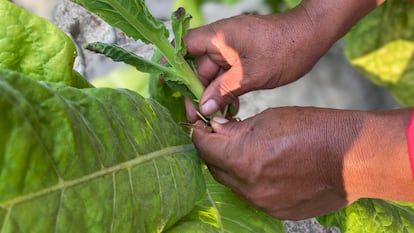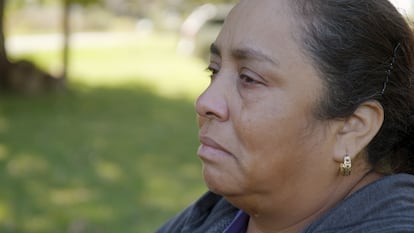Born without arms or legs: the young man who symbolizes how America neglects its most vulnerable farmhands
Carlos Candelario was born without limbs, after his mother — a farm laborer — was exposed to dangerous pesticides during her pregnancy. His story is a reminder of the vulnerability of the workers who feed the world’s largest economy

This text comes from the Univision News investigation ‘Exposed: Latino farmworkers risk their health working under threat of pesticide exposure.’ You can real the full special here.
Carlos Candelario was born on December 17, 2004, without arms or legs. He spent years trying to understand why this happened to him. He read about his story and that of others. And, after seeing the impact his case had in the United States, he found the answer: pesticides. His mother, Francisca Herrera, had been exposed to a cocktail of dangerous chemicals while working in tomato fields for Ag-Mart Produce in Florida and North Carolina. Unbeknownst to her, she was in the first trimester of her pregnancy at the time, when Carlos’ brain, spinal cord, heart and limbs were forming. With the help of a lawyer, the family eventually sued the company.
Dr. John Reigart, a pediatrician, was consulted as an expert in this case. In his meetings with Francisca Herrera, he told her that workers at Ag-Mart farms were sprayed with chemicals almost every day and that those who felt ill weren’t taken to the doctor. Instead, they were asked by their bosses to sit down for a while, drink water and return to work. “Clearly, they were all heavily exposed to pesticides and received no medical care in the field,” Reigart explained, in an interview with Univision via Zoom.
According to Candelario’s attorney, Andy Yaffa, the company was found to have used 18 pesticides on its crops, six of which were toxins known to cause birth defects. He says rules and regulations for their use were not followed. “There was a long list of negligent acts committed by Ag-Mart with regard to Carlitos,” he explains.
In 2006, Donald Long — the agricultural company’s president — said in a sworn statement that the firm was unaware of the harm these unscientific pesticides could cause: “We’re working within the labels and following their recommendations. It doesn’t say on the label [of the pesticides linked to birth defects] ‘do not allow pregnant women to work [in contact with] this,’ even though it has the warning that it might cause problems.”
Every day, Francisca Herrera and other women — some of them pregnant — went into the fields clean and came out soaked in pesticides, without anyone informing them of the risks of exposure. “This company didn’t say anything to Francisca or any of the women who were working in the fields. They weren’t given any options,” Yaffa laments. After Carlos Candelario, other women working as agricultural laborers gave birth to more babies with malformations.
On March 13, 2005, The Palm Beach Post ran a front page story about Francisca Herrera. “People have mentioned to me that maybe this has to do with chemicals. But I really don’t know anything about that. I would like to know,” Herrera told the paper. Univision attempted to interview Ag-Mart executives, but received no response.
“They weren’t given any options”
That same month, the Florida newspaper reported the birth of two other children, who also suffered from severe health conditions. Jesus Navarrete was born on February 4, 2005, with an underdeveloped jaw. He is believed to have survived. The third child was born on February 6, 2005, but died three days later from “massive birth defects,” the paper wrote. The baby had a cleft palate, no visible sexual organs and only one kidney.
The mothers of the three babies all lived on the same field owned by Ag-Mart, just a few yards away from each other. They had all picked tomatoes on the company’s farms in North Carolina and Florida.
“I want people to understand that pesticides can have disastrous consequences,” Carlos Candelario told Univision News. Dr. Reigart — in his analysis of the young man’s case — found that some of the pesticides applied by the company in its fields had been linked to birth defects in experimental studies with animals. These defects were similar to those suffered by Candelario and other infants.
The pediatrician remembers his meeting with the company’s lawyers. “They looked at me and said: ‘The fact that it occurs in animals doesn’t mean that it can occur in people.’ I answered that of course that wasn’t true, because all the regulations for the use of pesticides in the United States are based on [experiments that use animals]. If [the test animals] show [adverse] effects, then licenses aren’t granted.”
In 2005, health and agricultural authorities in North Carolina and Florida investigated the pesticide exposure that Francisca and other mothers were subjected to during a crucial period for fetal development.

To conduct their analysis, the authorities used company records, which noted what pesticides were applied, on which dates and on what fields. But the information provided by Ag-Mart was incomplete, meaning that the agencies couldn’t definitively prove the link between Francisca’s exposure to the chemicals and Carlos’ birth defects. Still, the investigators affirmed that the case revealed the need to reduce pesticide exposure among agricultural workers, while also highlighting the risks of not following the instructions on the labels of the pesticides.
Following an agreement between the family and the tomato grower Ag-Mart, Carlos Candelario received a trust fund in 2008 that would cover his expenses for life. This settlement eased the situation for his family members, who were left without work when the complaints began. For a time, they even had to live in homeless shelters. On a broader scale, Carlos’ case has allowed activists to gather evidence to show why it’s important to have greater regulations to protect farmworkers.

Activist Jeannie Economos coordinates a project through the Farmworker Association of Florida (FWAF), which seeks to teach farmworkers how to protect themselves from pesticides. She explained that the protections that were given to farmworkers at the time by the Agricultural Worker Protection Standard (WPS) — the regulatory framework laid out by the U.S. Environmental Protection Agency (EPA) to protect laborers from exposure to pesticides — were “minimal.” They contemplated the training of workers in pesticide usage every five years and didn’t require employers to put up signs to notify individuals if a field had been sprayed. Nor were employers required to keep detailed records of the pesticides applied.
In 2015, all of this changed. Training was mandated to be carried out every year, while employers were required to notify employees if a field was sprayed and specify how soon afterwards anyone could enter. Agricultural firms were also required to keep a detailed record of the pesticides applied.
An experiment
Almost 20 years after that emblematic case, Economos believes that farmers in the United States still don’t have the necessary protections. “Farmworkers have told us that their employers care more about their crops than about them… that they care more about the production line than about their lives.”

Over the course of two years, Univision spoke with more than 30 workers in North Carolina, Florida, Michigan and Illinois to understand their exposure to pesticides in their daily work. Farm laborers noted that they can be sprayed while picking vegetables and fruit, or while clearing weeds in fields and nurseries.
Not all incidents are investigated. This is because farmers prefer to remain silent for fear of reprisals or discrimination. And, oftentimes, when a complaint is filed, a long time has passed since the incident occurred. Evidence — as simple as clothing soaked with chemicals — hasn’t been collected. According to the EPA, in almost 60% of all cases that are addressed, the punishments consist solely of warnings. In only 9% of cases are fines imposed, generally in the hundreds of dollars.
Univision interviewed at least 15 experts who helped develop a scientific tool to explore some of the pesticides that farmers are exposed to in their daily environment. These silicone bracelets are capable of detecting up to 75 pesticides. For at least five days, they were placed on 10 field workers — either undocumented individuals, or those on temporary work visas (the H-2A temporary agricultural program) — who worked in apple, pumpkin, blueberry or tobacco fields, or in nurseries in Florida, Michigan and North Carolina.
All of the bracelets recorded pesticides — 18 in total — similar to those reported by scientific studies conducted with larger populations. With the help of a toxicologist and two medical anthropologists, Univision analyzed the results. The experts warned that these should be seen as a mere snapshot of the pesticides that farm laborers were exposed to. The results wouldn’t show how much of the pesticides had entered their bodies.
The bracelets of three of those farmers recorded exposure to organophosphates, a class of pesticide linked to an increased risk of cancer, reproductive problems and neurological diseases. Four bracelets showed exposure to two organochlorines that were supposedly banned decades ago: 4,4′DDE and trans-nonachlor.
Linda Forst — a physician and professor of occupational and environmental health at the University of Illinois Chicago (UIC) — explains that this doesn’t mean that the organochlorines were used recently. They appeared in the analysis because they’re chemicals that can persist for years in an environment.
Two bracelets detected chlorpyrifos at a time when it was banned from food crops across the United States. Scientific studies have linked it to damage to children’s neurological development.

Sara Quandt — a medical anthropologist and professor emeritus at Wake Forest University School of Medicine — says it’s hard to know where exactly the workers were exposed to chlorpyrifos. The pesticide can linger for years in environments that don’t have much access to sunlight or rain, both of which contribute to its degradation.
“It could have been applied to the crops they were working on, but it could also have been detected in their homes, in their vehicles… anywhere else they were while wearing the bracelets,” Quandt cautions.
All of the workers were exposed to pyrethroids, a class of insecticide increasingly used in agriculture. It’s associated with adverse effects on the cardiovascular and nervous systems.
A flawed system
Jeannie Economos recalls that, in her conversations with farm laborers in Florida, she’s been told that doctors in rural areas aren’t trained to recognize a pesticide rash, let alone determine its origins. As a result, workers are prescribed dermatitis ointments and given the green light to return to work the next day: there’s no official record of either the chemical exposure or the workplace incident. Activists in other states tell the same story.
Then, there are the long-term effects of pesticides. Experts say they’ve met farmers who’ve dedicated their lives to agricultural work. Over the years, they’ve become ill with cancer, lupus, or rheumatoid arthritis. They’ve seen children of farm laborers with severe developmental disabilities. All of these are conditions that scientific research has linked to different pesticides.
“There’s no system to track exposure over time. So, if [farmworkers or their families] develop Parkinson’s in their 70s or 60s, there’s no way to connect it to the pesticides they [were exposed to] early in their career,” Quandt says.

Some of the farm laborers interviewed for this report fell ill with cancer, or had rashes so severe that they required chemotherapy. Some of them continue to be exposed to pesticides while working in agriculture. They have no other option to support their families.
Activists such as Jeannie Economus have felt helpless in the face of the lack of answers for the victims. She explains that she had to step away from working with farmers for about five years, because she felt like crying when they asked for help and she couldn’t give them any. “Do you know what it’s like to have a title that says ‘pesticide safety and environmental health project coordinator’ and look in the face of a farmworker who’s telling me about their pesticide exposure case and say: ‘I can’t do anything to help you. Our laws aren’t strong enough to help you’? It’s heartbreaking.”
Translated by Avik Jain Chatlani.
Sign up for our weekly newsletter to get more English-language news coverage from EL PAÍS USA Edition
Tu suscripción se está usando en otro dispositivo
¿Quieres añadir otro usuario a tu suscripción?
Si continúas leyendo en este dispositivo, no se podrá leer en el otro.
FlechaTu suscripción se está usando en otro dispositivo y solo puedes acceder a EL PAÍS desde un dispositivo a la vez.
Si quieres compartir tu cuenta, cambia tu suscripción a la modalidad Premium, así podrás añadir otro usuario. Cada uno accederá con su propia cuenta de email, lo que os permitirá personalizar vuestra experiencia en EL PAÍS.
¿Tienes una suscripción de empresa? Accede aquí para contratar más cuentas.
En el caso de no saber quién está usando tu cuenta, te recomendamos cambiar tu contraseña aquí.
Si decides continuar compartiendo tu cuenta, este mensaje se mostrará en tu dispositivo y en el de la otra persona que está usando tu cuenta de forma indefinida, afectando a tu experiencia de lectura. Puedes consultar aquí los términos y condiciones de la suscripción digital.








































